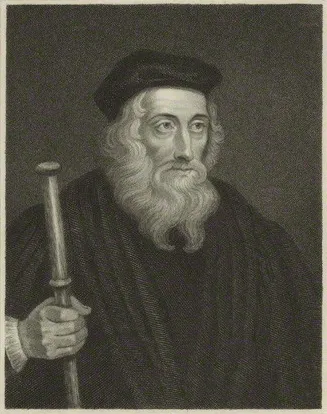
Name: John Wycliffe
Birth Year: 1331
Death Year: 1384
Nationality: English
Profession: Philosopher, theologian, and translator
Notable Contributions: Pioneered the translation of the Bible into English and criticized the Catholic Church.
1384 – John Wycliffe, English philosopher, theologian, and translator (b. 1331)
In the heart of the 14th century, a revolution was quietly brewing in England. John Wycliffe, born in 1331 into a society steeped in tradition and authority, would soon emerge as a pivotal figure in this nascent movement that sought to challenge the status quo of the Church. With his keen intellect and deep-seated beliefs, Wycliffe navigated the intricate landscape of medieval philosophy and theology.
As he delved into academic pursuits at Oxford University, he began to question not just the doctrines of Christianity but also the very foundations upon which they were built. His early years were marked by rigorous study; however, it wasn’t until he began translating the Bible into English that his true legacy began to take shape. This was no small feat in an era where Latin reigned supreme as the language of scholarship and more importantly the Church.
Despite facing fierce opposition from ecclesiastical authorities who viewed his translation efforts as heretical, Wycliffe remained undeterred. In fact, it can be argued that these challenges only fueled his passion further. He believed that every individual should have access to Scripture something revolutionary for a time when laypeople had limited understanding and contact with biblical texts.
It’s ironic how such radical ideas flourished amid growing dissatisfaction with clerical corruption and abuses within church practices. The Black Death had swept through Europe just decades earlier, shaking faith itself; people sought answers amid chaos perhaps Wycliffe offered those answers wrapped in accessible language.
In 1377, one critical moment marked a turning point: Pope Gregory XI condemned Wycliffe's writings as heretical. However, this condemnation did not silence him; instead, it galvanized his followers the Lollards who rallied around his teachings even after his death.
Wycliffe’s philosophy extended beyond mere biblical translation; he also critiqued various church doctrines such as transubstantiation and advocated for a return to what he considered true Christianity based on Scripture alone a precursor to later Protestant thoughts! His sermons emphasized moral integrity among clergy members while passionately arguing for Christ's sovereignty over all earthly institutions.
This led many contemporaries to view him not only as an enemy of established religious order but also as a beacon of hope for reformers who followed suit centuries later including Martin Luther himself! Perhaps one could speculate on how different our modern understanding of faith might be had Wycliffe never ventured down this path of dissent?
The culmination came when John Wycliffe passed away on December 31st, 1384. His death did not signify an end but rather birthed new life into ideas previously whispered only behind closed doors. Ironically enough though physically absent from their midst his spirit lingered like a shadow over subsequent movements aiming towards church reform.
A Legacy Beyond His Years
Historians recount that approximately four decades posthumously after Wycliffe's demise; local authorities ordered exhumation which ultimately resulted in burning both bones & writings associated with him! Yet here lies an intriguing twist: despite attempts at erasure from history books as we know now his influence only grew stronger across generations!
The Modern Resonance
A world still grappling with questions surrounding religious authority has much it can learn from John Wycliffes’ legacy today! In this era dominated by digital communication platforms where information spreads like wildfire it seems almost fitting how accessibilty remains central theme echoing throughout time since then!
Even today, movements advocating for transparency & democratization within various institutions reflect echoes reminiscent Of what John preached so many centuries ago!
A Cultural Connection
Looking closely at popular culture today reveals perhaps another layer connecting us back to figures who embody lone defiance against oppressive systems for instance artists challenging norms via music or social media influencers using their platforms amplify voices marginalized often forgotten altogether too easily!
The 'lone wolf' image celebrated by Gen Z individuals online reminds us there will always remain those brave enough stand up & advocate justice even amidst prevailing opposition with roots tracing back directly attributable through courageous souls such those experienced persecution historical days...
An Introspection On Faith And Power Dynamics
If we pause long enough contemplate nuances around themes presented during Wylicffes' lifetime… its fascinating consider how often similar issues arise even now concerning faith versus power dynamics within organized religions globally alluding once again drawn parallels revisiting struggles faced previous leaders attempted challenge paradigms held tightly still prevalent today!
This reflection holds value especially when evaluating whether humanity learns lessons imposed onto them throughout history or continues repeat same patterns eventually leading cycles unbroken tragic outcomes repeatedly repeating themselves over eras passing us by?
A Fitting Conclusion?
If you ponder upon these questions raised ultimately invite contemplation regarding legacies left behind: What truly defines greatness? Is it merely volume words spoken or courage expressed standing firm convictions even if faced unimaginable trials? In closing therefore may we heed reminders echoed past centuries ago: Our choices ripple forth far beyond ourselves shaping futures yet unfold ahead waiting discovery yet embrace wholeheartedly transformation lie therein… “

